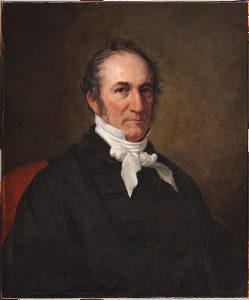
Edward Tyrrel Channing (December 12,1790-February 8, 1856) was a professor of Rhetoric and Oratory at Harvard college. Channing was born to William and Lucy Channing in Newport, Rhode Island. In 1807, he graduated from Harvard College and moved to Boston where he began to practice law, although his primary interest was always rhetoric and literature. From 1818-1819, Channing served as the second editor of the North American Review. However, Channing’s most remembered career was his position teaching at Harvard.
Channing was the most influential teacher to many famous scholars of the 19th century, Thoreau and Emerson included. During his Harvard years, Thoreau was taught by Channing every semester for three years. Channing assigned Thoreau many laborious assignments, all graded unforgivingly. These essays reflect the rigid and standardized structures that Harvard forced upon its students. Thoreau’s writing under Channing stands in vast contrast from his essays as an adult.
Channing’s stringent style made him unforgettable. He was most notable for calling students to the front of the class while he critiqued their essays out loud. As such, his classes were not for the faint of heart. However, there was a method to his madness. Having Channing as a professor for three full years ridded Thoreau of any immature writing habits he had and gave Thoreu the writing abilities he needed to start his career.
Additionally, Channing endeavoured to push Thoreau out of the realm of comfort. Under Channing, Thoreau was constantly asked to become a more provocative and well-thought writer. Channing wanted his students to be well-read, but also to think for themselves.
In 1837, Thoreau did exactly that. As one of Thoreau’s last assignments, he was tasked with an essay on what makes a nation “barbaric or civilized.” Thoreau’s response was that
“A nation may be ever so civilized and yet lack wisdom. Wisdom is the result of education, and education being the bringing out, or development, of that which is in a man, by contact with the Not Me, is safer in the hands of Nature than if Art. The savage may be, and often is, a sage. Our Indian is more of a man than the inhabitant of a city. He lives as a man—he thinks as a man—he dies as a man.”
In this moment, Thoreau embodied the strong writing of a Channing graduate, yet quintessential Thoreauvian individualism. Ultimately, it was Ellery Tyrell Channing that laid the foundation that made Thoreau the writer that he was.

